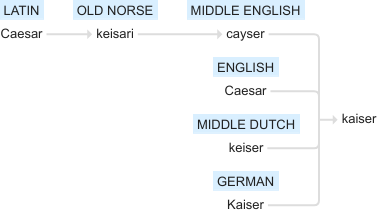Kaiser
Middle English cayser, from Old Norse keisari, based on Latin Caesar (see Caesar1), and later reinforced by Middle Dutch keiser . The modern English form (early 19th century) derives from German Kaiser .
wiktionary
From German Kaiser(“emperor”), from Proto-West Germanic *kaisar, from Proto-Germanic *kaisaraz. The native Old English descendant of that Proto-Germanic word was cāser(“emperor”), but the shape of Middle English caiser, kaiser(“emperor”) suggests it was borrowed from another Germanic language rather than inherited, and the modern English spelling and sense seem to be again borrowed from German rather than inherited from either earlier word. [1] [2] [3] [4]
etymonline
kaiser (n.)
1858 in reference to the emperors of Austria and (after 1870) Germany, from German Kaiser, Bavarian and Austrian spelling variant of of Middle High German keisar, from Old High German keisar "emperor," an early borrowing of Latin cognomen Caesar.
The Germanic peoples seem to have called all Roman emperors "caesar" (compare Old English casere, Old Norse keisari "an emperor"). The word also entered Germanic via Gothic, perhaps from Greek. According to Kluge, one of the earliest Latin loan word in Germanic. The Old English word fell from use after Middle English.
